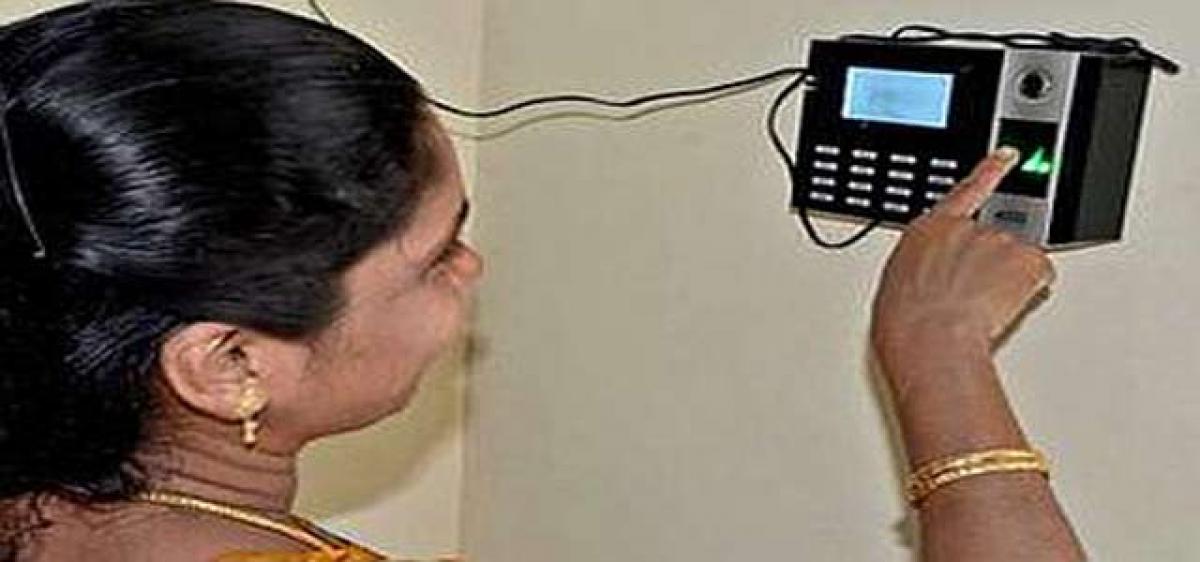Live
- Punjab: AAP legislator Naresh Yadav gets two years in jail
- Will help make India centre of the logistics world: Gautam Adani
- Rohan Verma to discontinue as MapmyIndia CEO, to launch consumer biz
- Need more neurologists, must leverage telemedicine to tackle stroke burden in India: Health Ministry
- Kejriwal faces ‘water attack’ during padyatra
- Puttur MLA’s Plan to Demolish Women's Police Station Draws Public Backlash
- Transformative Growth in Aija Primary Agricultural Cooperative Society: Transfers, Promotions, and New Initiatives.
- Punjab CM inaugurates subdivisional complex constructed in record time
- The aim is to win Olympic gold to keep the family legacy going and get married, says Hardik Singh
- Italian vessel’s visit a moment of celebration in two nation’s ties: Sarbananda Sonowal
Just In

The move to introduce biometric attendance system in colleges (of all the places!) has already unnerved a section of students and some faculty members, though the authorities aver that it is essential to bring about transparency and prevent manipulation of records.
Hyderabad: The move to introduce biometric attendance system in colleges (of all the places!) has already unnerved a section of students and some faculty members, though the authorities aver that it is essential to bring about transparency and prevent manipulation of records.
With Deputy Chief Minister and Education Minister Kadiyam Srihari declaring the initiation of biometric attendance system in colleges, the Jawaharlal Nehru Technological University Hyderabad (JNTU-H) is set to launch the first phase of its biometric attendance system in all its affiliated colleges with effect from January 9.
It has urged all the colleges concerned to adopt biometric attendance for both students as well as faculty members.
Although the new system of recording attendance was supposed to begin by the third week of December, JNTU had a tough time finding enough vendors and managing the contracts for machines so that they can be arranged in all the 158 engineering colleges across Telangana. Depending on the outcome of the first phase, JNTU will come up with ‘more secure and advanced methods’ for students in the second phase.
Hailing the new step, Sreenivasa Rao, Director of Academic Audit Cell of JNTU, says:“There are many engineering colleges which represent false data and statistics every year that show more members of staff than what the college actually has and also good attendance by students.
In order to cut down this kind of manipulation and to make things transparent, we have begun this new system. There are many students who take scholarships which completely rely on the attendance percentage with a cut-off of 70 per cent; so, there won’t be any manipulations under this new system.”
There are certain disadvantages of implementing this new rule and not all faculty members of the college are happy. Neither are the students.
Dinesh Kumar, Head of the Department from Vignan Institute of Technology, says: “There are both pros and cons of this digitisation of attendance. Once the faculty is regular; so would be students.
But this is like a huge burden on the colleges when it comes to financial aspects. As the design is by man so he also finds the loopholes of the machines, especially the young blood, which is hard to control these days. I don’t think this new rule will be hard for such students who come up with new strategies to escape this process.”
Jain Kulakarni, Head of the Department from VBIT Engineering College, says: “There is no university across India which has such biometric attendance system established; it is our Hyderabad students and also the faculty who forced the university to come up with such a rule.
It is sad that we reached such stringent phase of learning. JNTU till date has never taken a stand against misuse of attendance records of faculty and students, but with colleges mushrooming every year, the quality of education has drastically come down, leading to poor education of faculty members and so is the education system.”
“Installation of biometric attendance system just doesn’t solve the problem. JNTU should actually organise orientation lectures to make the colleges aware of how seriously this is being followed up with clear manual instructions.
There should be no loopholes in the system which people can take advantage of,” observes Kulkarni. Some others ask: If academicians are going to be busy with the admin process, when will they start concentrating on sharing knowledge?
If they are burdening the staff with a new rule, then they should make sure that it must be fruitful to the complete extent, say some professors, responding to JNTU’s initiative. As for most students, this new rule is a strict no-no. Most of the students already have plans to defy this rule.
Right from creating a wet plaster of paris of the fingerprint to nothing short of breaking the machines, there are numerous options that students have.
It is high time JNTU started this process after taking proper measures, bemoan faculty members of certain engineering colleges. There are 158 engineering colleges across Telangana with over 57,000 students

© 2024 Hyderabad Media House Limited/The Hans India. All rights reserved. Powered by hocalwire.com







